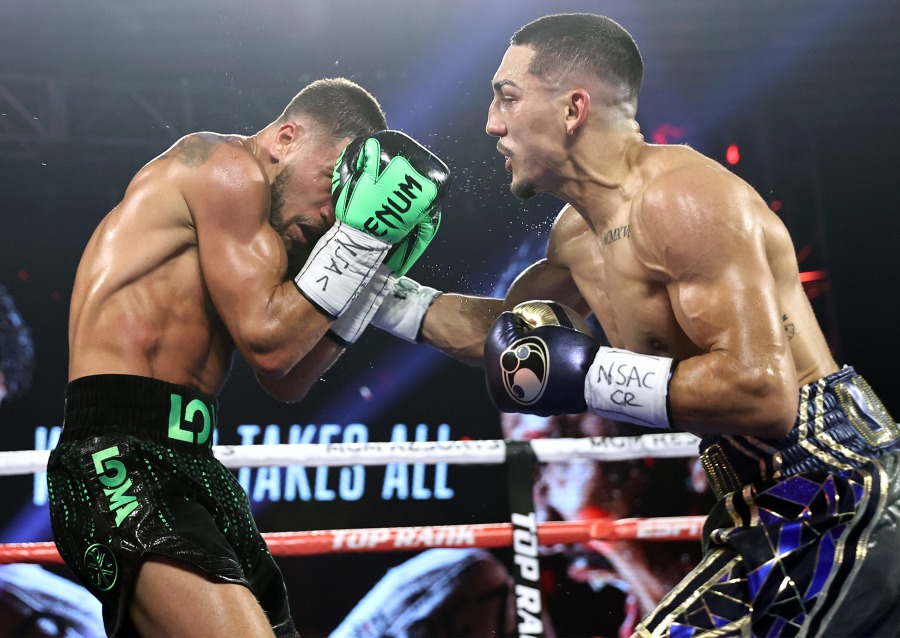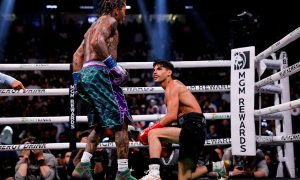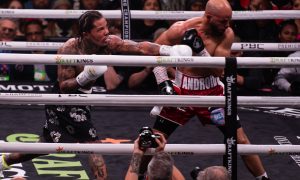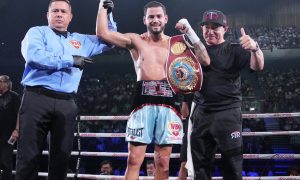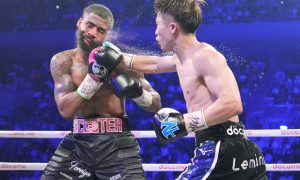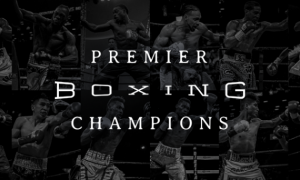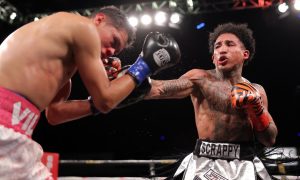On the weekend of October 17, the sport of boxing gained a new superstar in Brooklyn, New York’s Teofimo Lopez (16-0, 12 KOs).
Lopez won a unanimous decision over top pound-for-pound fighter Vasiliy Lomachenko (14-2, 10 KOs) to become the Ring Magazine, IBF, WBO, WBC “Franchise” and WBA “Super” Lightweight champion.
The 23-year old Lopez has now entered many pound-for-pound lists, including ESPN’s at the No. 5 spot.
With the victory, Lopez became the second-youngest fighter behind Mike Tyson to unify three titles in a division.
While Lopez is clearly the number one fighter at Lightweight, some dispute has been placed on his undisputed status in the division.
Currently, Baltimore, Maryland’s Gervonta “Tank” Davis (23-0, 22 KOs) holds the WBA “Regular” Lightweight title. He will defend that title against Leo Santa Cruz in a Junior Lightweight bout that will also have Santa Cruz’s WBA “Super” Junior Lightweight title on the line.
Davis fighting for two titles from different divisions in one fight is confusing, but isn’t unprecedented in boxing.
In September 2014, Floyd Mayweather Jr. defended his WBA and WBC Welterweight titles along with his WBC Junior Middleweight title against Marcos Maidana.
Most notably, Ray Leonard fought Donny Lalonde for the WBC Super Middleweight and Light Heavyweight titles at the Super Middleweight limit of 168 pounds in November 1988.
Over the last decade, the WBA (World Boxing Association) has watered down their titles by having so many champions in each division.
The WBA currently has three Welterweight champions with Manny Pacquiao holding the “Super” version, Yordenis Ugas holding the “Regular” version, and lastly, Jamal James holding the “Interim” version.
Initially, Lomachenko won the WBA “Super” Lightweight title when he stopped Jorge Linares in the 10th round at Madison Square Garden in May 2018.
Davis won the Regular version last December when he stopped Yuriorkis Gamboa in the 12th round.
Davis’ promoter Floyd Mayweather Jr. recently spoke his mind during a live stream on Showtime Sports’ YouTube channel giving his view on the current landscape of boxing’s world titles.
“I don’t care if it’s Top Rank, if it’s Golden Boy, if it’s Mayweather Promotions, if it’s PBC – there’s too many champions in the sport of boxing right now,” stated Mayweather. “It’s no such thing as a super champion, not at all. And I’m not taking nothing away from no fighter. It’s too many belts.”
The WBA isn’t the only belt organization that has muddied the waters for world champions in boxing.
In the summer of 2019, the WBC (World Boxing Council) created the WBC “Franchise” championship distinction. The first champion to hold this status was Saul “Canelo” Alvarez.
This allowed for Jermall Charlo to be recognized as the WBC Middleweight champion, although Alvarez initially won the title when he defeated Gennadiy Golovkin in September 2018.
The WBC President Mauricio Sulaiman, during a Zoom conference call with Boxingscene.com, explained the Franchise title status before the Lomachenko-Lopez bout took place.
“The concept of the Franchise champion is to be presented to very fighters who have specific set of attributions, like Canelo and Lomachenko,” said Sulaiman. They have fight in several weight classes. The Franchise designation with Lomachenko permitted him to have this fight with Teofimo Lopez.
“Lomachenko is the WBC Lightweight champion. He won and petitioned for the Franchise designation. The Franchise is put above any champion in the Lightweight category. So Lomachenko is, in fact, champion with special attributes.”
The distinction of the WBC Franchise Lightweight champion was given to Lopez after he defeated Lomachenko.
The Ukrainian initially won the vacant WBC Lightweight title in August 2019 when he won a unanimous decision over Luke Campbell in a fight held in the United Kingdom.
Less than a month later, 21-year old Devin Haney won the “Interim” WBC Lightweight title when he stopped Zaur Abdullaev after four rounds.
Lomachenko was elevated to Franchise WBC Lightweight champion in October 2019.
Shortly afterward, Haney was moved to full championship status with the WBC and will defend that title against Yuriorkis Gamboa next month in November.
Haney has dealt with a massive amount of criticism from fans and pundits for holding the WBC Lightweight title, and many do not recognize him as a legitimate titleholder.
For Lopez defeating Haney to settle any dispute to his status as the undisputed Lightweight champion is something he is willing to do, but isn’t a priority. He is clearly the best Lightweight in the world with or without a victory over Haney.
“I don’t mind beating the two-time email world champion,” said Lopez at the post-fight press conference following his win over Lomachenko. “I know a lot of people are saying this win against Lomachenko is not for undisputed because of that Mauricio Sulaiman and whatever he did.”
“I don’t think any of these guys will step up to the plate. And if they do they better be ready because I don’t fear no man. I told you guys this. I don’t care. I’m in there to fight, and if you’re not there to fight with me, you’re gonna lose, like Loma.”
While who holds which title and which one counts and which one doesn’t is up for debate, Lopez is the man at Lightweight with the most options.
At 23, Lopez’s time as a Lightweight is limited, and a move to Junior Welterweight is the logical next step.
Fights with Haney and Davis for Lopez would garner enough attention should they both come out victorious in their upcoming bouts; however, what’s to stop the WBA or WBC from creating more titles at their leisure?
Unfortunately, the WBA and WBC have sullied for fighters what it means to be undisputed for a division, and it will be up to fans and pundits to decide who is the best in each weight class.
The WBO and IBF will hopefully not follow suit by creating more faux titles, but it may just be a matter of time.
World titles allow for fighters to make more money and open up opportunities for fights that may not have existed beforehand.
The belts do matter to those that step in the ring. It’s time for them to matter more to those who are in charge of the title organizations.





